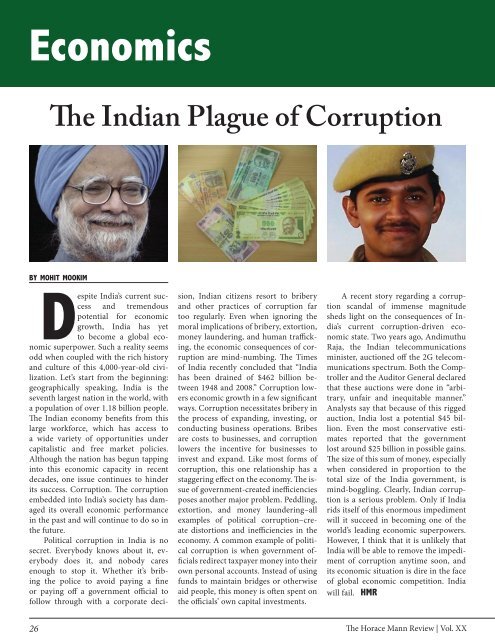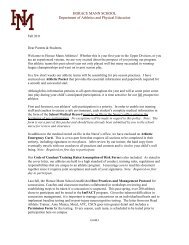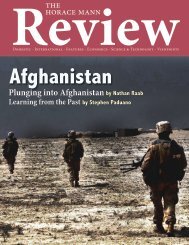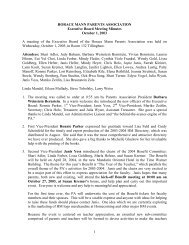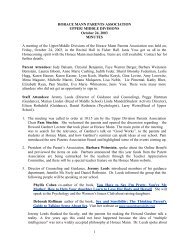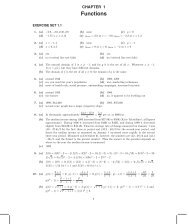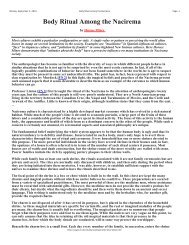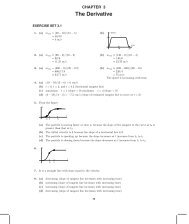Create successful ePaper yourself
Turn your PDF publications into a flip-book with our unique Google optimized e-Paper software.
Economics<br />
Economics<br />
The Indian Plague of Corruption<br />
by mohit mookim<br />
Despite India’s current success<br />
and tremendous<br />
potential for economic<br />
growth, India has yet<br />
to become a global economic<br />
superpower. Such a reality seems<br />
odd when coupled with the rich history<br />
and culture of this 4,000-year-old civilization.<br />
Let’s start from the beginning:<br />
geographically speaking, India is the<br />
seventh largest nation in the world, with<br />
a population of over 1.18 billion people.<br />
The Indian economy benefits from this<br />
large workforce, which has access to<br />
a wide variety of opportunities under<br />
capitalistic and free market policies.<br />
Although the nation has begun tapping<br />
into this economic capacity in recent<br />
decades, one issue continues to hinder<br />
its success. Corruption. The corruption<br />
embedded into India’s society has damaged<br />
its overall economic performance<br />
in the past and will continue to do so in<br />
the future.<br />
Political corruption in India is no<br />
secret. Everybody knows about it, everybody<br />
does it, and nobody cares<br />
enough to stop it. Whether it’s bribing<br />
the police to avoid paying a fine<br />
or paying off a government official to<br />
follow through with a corporate decision,<br />
Indian citizens resort to bribery<br />
and other practices of corruption far<br />
too regularly. Even when ignoring the<br />
moral implications of bribery, extortion,<br />
money laundering, and human trafficking,<br />
the economic consequences of corruption<br />
are mind-numbing. The Times<br />
of India recently concluded that “India<br />
has been drained of $462 billion between<br />
1948 and 2008.” Corruption lowers<br />
economic growth in a few significant<br />
ways. Corruption necessitates bribery in<br />
the process of expanding, investing, or<br />
conducting business operations. Bribes<br />
are costs to businesses, and corruption<br />
lowers the incentive for businesses to<br />
invest and expand. Like most forms of<br />
corruption, this one relationship has a<br />
staggering effect on the economy. The issue<br />
of government-created inefficiencies<br />
poses another major problem. Peddling,<br />
extortion, and money laundering–all<br />
examples of political corruption–create<br />
distortions and inefficiencies in the<br />
economy. A common example of political<br />
corruption is when government officials<br />
redirect taxpayer money into their<br />
own personal accounts. Instead of using<br />
funds to maintain bridges or otherwise<br />
aid people, this money is often spent on<br />
the officials’ own capital investments.<br />
A recent story regarding a corruption<br />
scandal of immense magnitude<br />
sheds light on the consequences of India’s<br />
current corruption-driven economic<br />
state. Two years ago, Andimuthu<br />
Raja, the Indian telecommunications<br />
minister, auctioned off the 2G telecommunications<br />
spectrum. Both the Comptroller<br />
and the Auditor General declared<br />
that these auctions were done in “arbitrary,<br />
unfair and inequitable manner.”<br />
Analysts say that because of this rigged<br />
auction, India lost a potential $45 billion.<br />
Even the most conservative estimates<br />
reported that the government<br />
lost around $25 billion in possible gains.<br />
The size of this sum of money, especially<br />
when considered in proportion to the<br />
total size of the India government, is<br />
mind-boggling. Clearly, Indian corruption<br />
is a serious problem. Only if India<br />
rids itself of this enormous impediment<br />
will it succeed in becoming one of the<br />
world’s leading economic superpowers.<br />
However, I think that it is unlikely that<br />
India will be able to remove the impediment<br />
of corruption anytime soon, and<br />
its economic situation is dire in the face<br />
of global economic competition. India<br />
will fail. HMR<br />
26<br />
The <strong>Horace</strong> <strong>Mann</strong> Review | Vol. XX


